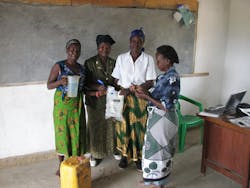About the author: Colin Hildebrandt is applications engineer for Puralytics. Hildebrandt can be reached at [email protected] or 503.869.5003.
Many regions in Malawi, Africa, are struggling with access to safe drinking water. Urban areas are subject to tap water supplies with little to no water treatment, while the surrounding rural communities are forced to drink from untreated and poorly maintained wells and boreholes, resulting in high rates of diarrhea and other sanitation-associated illness.
Establishing a way to implement long-lasting and meaningful improvements to health in developing communities such as those in Malawi is a top priority for many businesses and aid organizations. Puralytics, based in Beaverton, Ore., for instance, builds water purification products using light-activated nanotechnology. GS Malawi is an aid organization working in the Bolero and Mzuzu regions of the country. It runs projects focused on building education programs, access to safe water, and sustainable microbusinesses, working closely with community leaders through local staff.
Puralytics and GS Malawi partnered in November 2012 to provide SolarBags, a reusable water purification device, to the Malawians participating in GS Malawi’s existing programs. GS Malawi’s U.S. staff worked closely with Puralytics to acquire, ship and distribute SolarBags to five rural communities. Following training and distribution of the bags to the communities, local GS Malawi leaders monitored user response and adoption, as well as long-term performance of the bags, and coordinated with Puralytics over the Internet to ensure the project’s success.
The Product
The SolarBag is a transparent 3-liter bag that encloses a nanotechnology-coated mesh insert. When the bag is placed in sunlight, five photochemical processes are activated to eliminate a wide range of contaminants, including pathogens, heavy metals and chemical toxins.
The product is easy to use, only needing to be filled with water and left exposed to the sun for a few hours — meaning it can be used multiple times per day.
The bags last for 500 uses, weigh less than 100 grams, and do not require any technical skills or consumable materials to operate, making them ideal for massive distribution to communities with minimal education or infrastructure. A performance monitoring tool called Pur-Blue, a food coloring dye, was provided to track the ongoing treatment of the SolarBags throughout the field trial. This was done by adding a drop of Pur-Blue to the bag and seeing how long it took the blue color to disappear in sunlight.
The Project
The project was divided into two main phases: training and distribution, and use and monitoring.
In the training and distribution phase, the U.S. members of GS Malawi acquired 200 SolarBags and training materials at the Puralytics facility and securely transferred them to their Malawian staff in Bolero and Mzuzu. In November 2012, the Malawi staff oversaw the distribution of 114 bags to community leaders, who in turn managed distribution to selected heads of household who agreed to participate in the training and monitoring program. Each time the bags changed hands, the distributors were responsible for going through a specific training process that covered how to safely use them; this ensured that no one received one without having learned how to use it and its various capabilities. Throughout this process there were no incidences of stolen products or refusals to participate in the monitoring study. The participants’ eagerness confirmed a real need in the community for decentralized water treatment and suggested the bags would be a welcomed solution.
During the use and monitoring phase, after the users were trained and received their SolarBags, they were free to take them home. Each month, users would bring their bags to GS Malawi meetings, where they could be tested for ongoing performance and users could share their thoughts. This allowed the monitors to collect data regarding the health of the community, the adoption rate of the bags and their performance over time.
By educating and properly introducing the technology to the user base, the risk of rejection was low because users were confident in their understanding, and the need for purified water was one they understood well. Once residents started seeing results, interest spread rapidly throughout the community, driving demand.
The Impact
Over the course of six months between November 2012 and May 2013, the 114 SolarBags that were distributed to the Bolero and Mzuzu communities were tested monthly for contaminant reduction performance and ongoing use. Those tests showed that all of them continued to treat the water as intended throughout the six-month period, with the exception of four, which developed small leaks due to rough handling.
With less than 76% of the Malawian population having access to improved drinking water, the SolarBag was well suited for these communities, because it is reusable and requires no power, consumables or significant training. Each bag was estimated to be used an average of one to two times per day — producing 3 to 6 liters — providing drinking water for multiple people per household. Interviews with users indicated that a large majority (more than 80%) were drinking more water than usual with the SolarBag and felt ill less frequently. When asked why, users said that they trusted the bags because they eliminated bad odors from the water and saved them money as a result of not having to buy fuel to boil their water as an alternative treatment method.
At the conclusion of this trial, it is estimated that more than 600 people were able to drink more than 90,000 liters of purified water using the 114 bags distributed in the Mzuzu and Bolero communities. The users successfully demonstrated that each bag can produce water for only a few cents per liter over its lifetime. This is comparable to the cost, time and effort required to purchase fuel to boil water, while providing superior treatment that covers chemical toxins and heavy metals in addition to pathogens.
Download: Here
